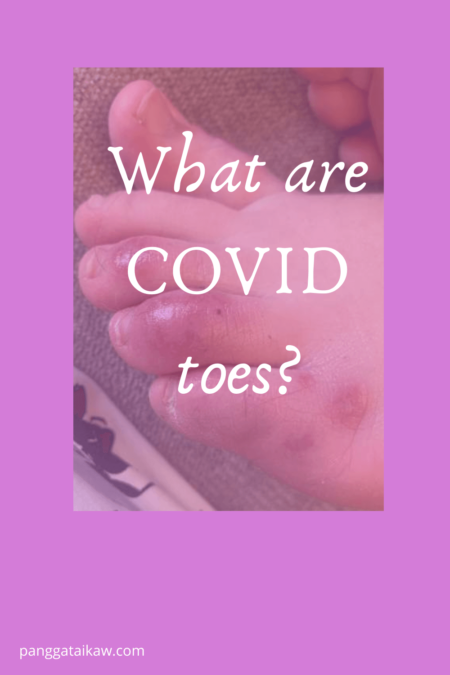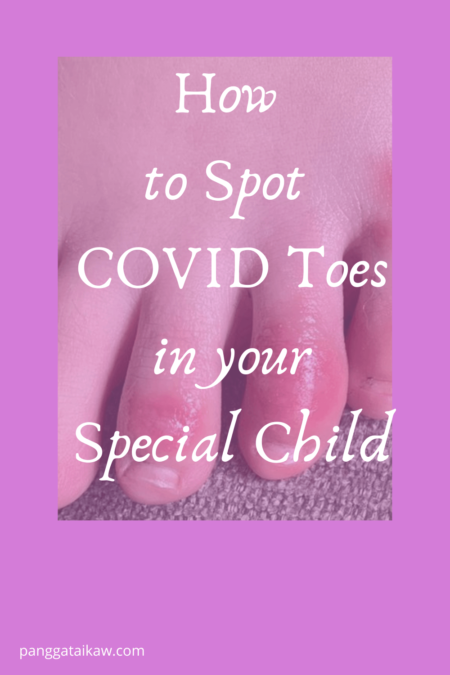Inside: As special needs parents, especially if your child is non-verbal, dealing with a COVID diagnosis is quite scary. Learn the answer to this newly found question, ” What are COVID toes? ” Can my special child get affected?
I was really touched by this story of a mom whose 5-year old son with Down syndrome, named Jack, contracted COVID-19 infection, sometime in March 2020, when everything was just starting to be serious like airports being closed, classes being made online and employees being told to work from home.
I remember exactly on March 18, I started working from home in my jammies and I felt so comfy and free, working on my own schedule and doing household chores on the side. It was kind of exciting to work from home, but scary to go out because of the threat of getting infected.
Katy, the special needs mom, said “I noticed that when I skipped the bedtime dose of Tylenol and /or Motrin for his high fever, Jack woke up in the middle of the night, crying and miserable. “ ” The next morning—the thirteenth day after Jack first became symptomatic, I went to get him out of bed, and he opened his eyes enough to see me, but wouldn’t sit up. I carried his limp body downstairs to the couch, and I tried to entice him into eating. Anything. Waffles? Goldfish? Fruit Loops? ” Read the full story here.
I could imagine how overwhelmed and scared Katy was, of the possible outcome of her dear son’s COVID diagnosis. And how all special needs parents could be, if their special needs child gets infected.
It could be devastating, I couldn’t agree more.
I know, it’s been six months since the lockdown in most places, but we all know that the COVID-19 pandemic is still around, although most, if not all places have started to open up businesses to protect our economy. Even schools are now open, maybe not all though. Most are still online, that’s for sure.
You, as special needs parents, are so concerned for your families, especially for your special child. You might have heard or read about how COVID can affect your kids and you want to be clarified on this question, “ What are COVID toes? ” Can it manifest in my special child if ever he gets hit with COVID? Or you could have observed them directly in your kid sometime but didn’t figure out what it was.
Before we go any further…..
Let us first look at some studies and statistics of COVID-19 infection in the pediatric population, which includes newborn to 18 years old.
Yes, it has been shown that COVID-19 affects all age groups including our children. Fortunately, doctors are happy to report that children in general, including our special kids, are only mildly affected as compared to the older people, who are usually from 65 and above. This is because your parents and your kids’ grandparents are more vulnerable, having chronic illnesses like diabetes, hypertension, heart diseases, cancer, etcetera.
A study was done in China ( published in the Pediatrics journal ) from January 16, 2020, to February 8, 2020, of COVID-19 cases of 2,135 pediatric patients. This was reported to the Chinese Center for Disease Control and Prevention. Statistically, more than 90% of all patients had asymptomatic, mild, or moderate illnesses. Children were considered those less than 18 years old. This study reflects all cases worldwide.
Conclusions from the study:
- Most of those affected children came from Hubei province ( where COVID-19 started ) and surrounding areas.
- Children of all ages are susceptible to COVID-19, with no significant sex preference.
- Clinical manifestations of children’s COVID-19 illnesses were generally less severe compared to adult patients.
- Young children, particularly infants, were vulnerable to infection.
- There is strong evidence of human-to-human transmission.
A recent study across the US has this report which is quite alarming.
More than half a million U.S. children have been affected with COVID-19, totaling to 513,415, according to the latest weekly report from the American Academy of Pediatrics ( AAP ) and Children’s Hospital Association. From those affected, at least 103 have died.
That being said…..
Let us try to clarify this.
Are COVID-19 symptoms different in kids than in adults?
Symptoms are noted to be the same in children and teens as in adults but most often, milder, although they could become serious and could even cause death. Some could be asymptomatic and still spread the infection.
On average, 1-10% of COVID-19 cases are seen in children.
However, in the above-mentioned study across the US, there was an increase of 16% from August 20 to September 3, 2020. Furthermore, those hospitalized are at high risk with co-morbidities, and these kids are more vulnerable because of obesity, chronic lung diseases, and prematurity. Kids under 2, as well as Black and Latino children, were also found to be more likely to be treated in the hospital.
Thus, you as special needs parents really have to be extra careful for your kids especially if they have co-morbidities, which could be more common than in regular kids.
What are the common symptoms of COVID-19?
Related post: How to Prevent COVID-19 ( Ways to Protect our Special Needs Kids )
Most of the time, the symptoms are much the same as the regular flu.
Dr. Aaron Michael Milstone, a Pediatric Infectious Disease expert at Johns Hopkins Children’s Centre, further said that some infected children may not have any signs of being sick at all.
Here are the common symptoms of COVID infection:
- Cough
- Fever or chills
- Shortness of breath or difficulty breathing ( seen more in adults )
- Muscle or body aches
- Sore throat
- New loss of taste or smell
- Diarrhea
- Headache
- New fatigue
- Nausea or vomiting
- Congestion or runny nose
- Loss of appetite ( especially seen in infants and young kids )
Pneumonia, a serious infection, and complication of COVID, seen usually in adults, can also be seen in children even though they can present with no obvious symptoms.
An August 2020 study from the Centers for Disease Control and Prevention concludes that about 8 children versus 165 adults in 100,000 population, were admitted to the hospital for COVID infection. Take note, among those admitted children, 1 in 3 required intensive care. Quite scary, eh?
Let’s move on to learn about this recent discovery. If you read articles about COVID, you will note that symptoms vary from person to person and new signs and symptoms are discovered from time to time and this is one of them.

Are they serious?
Initially reported by Italian doctors, COVID toes are characterized by redness and swelling in your child’s toes which could become blisters later. It could resemble frostbite.
They could be itchy and sometimes painful that your kid cannot wear shoes.
In several days, the redness becomes purplish and the lesions could spread in the other toes. It could also affect your child’s fingers.
More reported cases are seen in teens and young adults in their 20s.
Several studies were done to see what causes COVID toes.
One study concluded that the skin lesions may be secondary to small blood clots forming in the blood vessels, but they are not really associated with serious illnesses.
Some studies though say that they could be after-effects of just any viral infection, because some patients develop this redness and swelling, but tests negative for COVID.
Or they have no other symptoms or signs related to COVID, but they had a viral illness a few weeks before.
Luckily, ” COVID toes, ” just heal spontaneously and are not always related to COVID.
But of course, as parents, you could be concerned, so to be sure, get your child tested for COVID even if you just observe COVID toes ( can also affect fingers, but less often ) without respiratory symptoms, like colds, cough, or fever.
Are COVID toes found only in children?
They are not specific for children only, even adults can develop COVID toes. But they occur in only a small percentage of positive cases, based on some studies.
In a small Italian study in April 2020, 20 percent of COVID-positive patients develop these skin lesions in their toes or feet.
Studies in China reported 0.2 percent only are affected with COVID-toes.
In Spain and US though, they have reported more cases.
When do you need to bring your child to the hospital?
You are there for your child 24/7 so always be on the lookout for danger signs in your child. Your instincts are usually right.
Please don’t hesitate to bring your child to the hospital if you observe these:
- Refusing to eat or drink
- Spiking fever, more so with accompanying seizures
- Difficulty of breathing or catching his breath
- Confusion or inability to awaken
- Bluish lips or nail beds
Related post: How to Prevent COVID-19 ( Ways to Protect our Special Needs Kids )
Conclusion
As parents, you are able to observe your kids on a daily basis. Try to see and follow up that even with mild colds, fever, and cough, they could easily progress to a more serious illness.
Always think of COVID-19 on top of the list that could affect your special child. If symptoms are mild, which usually are in your kids, they would seem fine and still be playful, but just let them stay home and isolate if possible, so they won’t spread the virus.
If you find those reddish skin lesions in their toes or fingers, think more of COVID-19 than just any viral illness. Submit them for COVID-19 testing as soon as possible. Remember that they could test negative if testing is done in the early stage of the illness or they are not really COVID-19 infection, more so, just any viral illness.
But, for your peace of mind and as a concerned community member, please let your child stay at home and let him isolate to prevent spread.
COVID toes therefore can be seen in your special child and although it is not a serious manifestation, it could be related to COVID or any viral illness.
Has any member of your family especially your special child been sick with COVID-19? Did he develop COVID toes? Is he recovered? Share your story below.



I am not aware that COVID toes can affect special people!
I have to let my father know about this so he can check on my special sister (Down syndrome who is mute and deaf).
I have never really thought about COVID statistics that sound scary.
Thanks for such an informative post, I will make sure that I share this with my father.
HI Nuttanee,
Glad to be of help.
Thanks for sharing to your father.
Hope your special sister is doing well and safe from COVID.
God bless,
Marita
Hi Marita,
What a wonderful informative article. I had no clue what “COVID toes” was. And yes there is something new coming up all the time.
Do you think it is a mutation that are causing new symptoms or just an early lack of knowledge?
Laura
Hi Laura,
I don’t work in COVID Research, but I would assume ” COVID toes ” has been there, but just discovered recently due to continuous studies of this virus and how it affects us.
Thanks for visiting.
God bless,
Marita
Since the start of the pandemic, I have not made any research about Covid 19 in children and how there are symptoms in children as well, but after reading your post, I find it really fascinating how it can affect the kids too and how those in that province where it started off feel the effects on their children. This post is truly worth sharing.
Hi Suz,
Happy that I have shared valuable information, especially for parents who have children, and more importantly, if they have special needs.
Thanks for reading.
Marita
Hello Marita,
Thanks for sharing such wonderful information.
I am really amazed and never heard of COVID toes before now. Some times it’s best to make research and I feel really happy to have come across this article.
Now that I know about COVID toes, I can easily be able to assist anyone by informing them about it.
Cheers!
Justin
Hello Justin,
It’s always good to read or learn about updates of COVID infection, so when we and our family gets infected, we know what to do and how to get treatment.
Glad to be of help.
Marita
A really interesting read and I must admit I was intrigued to learn about COVID toes, as I have never heard of this before. COVID being a relatively new disease though there are still probably many things that we haven’t found out yet as far as other side effects go.
I was just wondering if this infection only happens if the patient is showing signs of COVID or could one be positive and not know it but still show symptoms of COVID toe? Also, does this only happen to young people, or are older people also prone to COVID toe?
Hi Michel,
On the contrary, research shows that COVID toes is not always associated with COVID infection, because some patients are negative in the tests. It could be an inflammatory effect of any viral infection, they say.
It could be present as well in older people, but more common in the younger age group, like kids and teens.
Thanks for reading.
Marita
Rather an interesting one to read on and know about. Though I lacked the very basic knowledge and all about covid toes before. Initially I thought it was another symptom just discovered manifesting covid19 too. However, it feels a lot better knowing it has no direct bearing and can self heal within few period of time. Thanks
Hi Nath,
Yes, knowing that it is self-healing and not a serious manifestation of COVID gives us relief, as parents. But we still have to submit our kids for testing to be sure if he needs to be isolated or not.
THanks for reading.
Marita
Never heard of Covid toes until today. This is an interesting read!
Scary time now but with this kind of information, we become knowledgeable about this disease and how we can prevent its spread.
More power!
Odette S.
Hi Odette,
Happy to provide valuable information.
Very true! We as parents to our kids need to be aware of updates about COVID-19 to protect our family.
Thanks for reading.
Marita